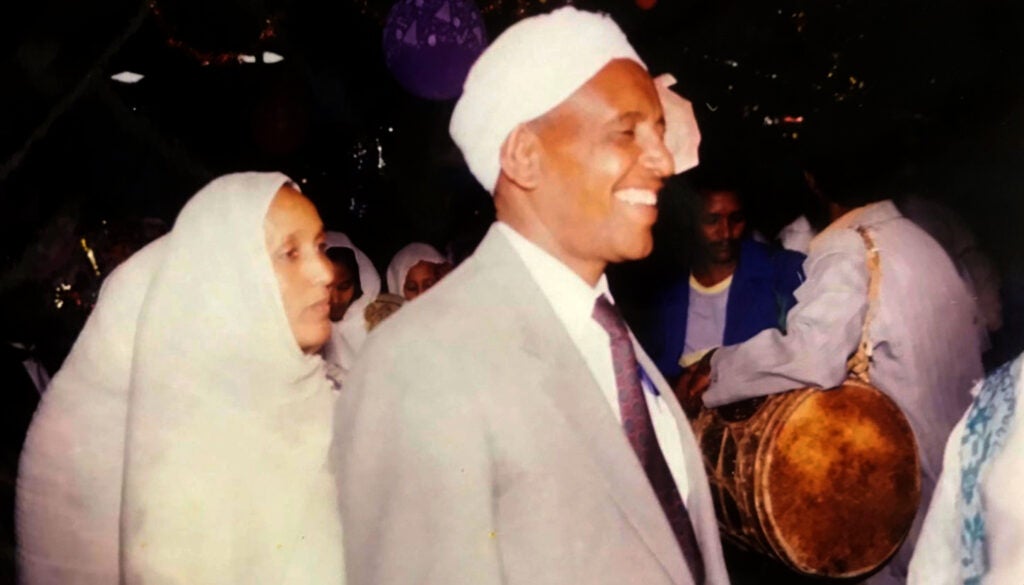Blackness & Faith Series: Black Love
Kawther Berhanu (COL ‘19, MSFS ‘22) is launching a Blackness & Faith series. She hopes to explore and create a portrait of Black Spirituality on the Hilltop—the joy and the struggle, the relational, the collective as well as the magical and the everyday. In her endeavor to explore what is on the hearts and minds of Black students on campus, she said it only made sense to open with Black love and to frame this series with the work of sage, sister, bell hooks. Kawther’s first installment of the series is a personal reflection on her grandfather and the love and wisdom he shared with his family.
All awakening to love is spiritual awakening. —bell hooks
When I read bell hooks’ All About Love, I thought of my grandfather, Baba Ali, whose Sufi traditions were my primary entry point to an Islamic understanding of a Loving God. When Baba lived with us, Thursday evenings were filled with weekly Quran recitation. My sisters and I all memorized Surah Yasin and Ar-Rahman, Ayat al Kursi purely from this recitation. He would start off with a group prayer and encourage us to contribute. He’d quiz us on our family tree while we’d scratch-off phone cards. We called a relative each week and he’d remind us that the love of family was spiritual. He’d tell jokes to me and my sisters, and we’d try to keep up with his Tigrinya. But in Ramadan, every night was Thursday night, and despite his passing, the month always reminds me of him. After breaking iftar and praying Maghrib, the sunset prayer, he would lead us in singing adhkar (Islamic remembrances): “Oh Allah certainly you are Most Forgiving. You Love to Forgive, so Forgive Me.” While the words were Arabic, the melody, cadence, and flow were unmistakably Eritrean.
When Baba found himself in my hometown speaking no English, he was eager to find ways to contribute to the local community. Just before iftar, my sisters and I would become a troupe of delivery women taking sweets, sambusas, rice, or Eritrean coffee to our neighbors at the direction of my mother and my grandparents. Though my neighbors were not Muslim, they started having a countdown to Ramadan too. I remember another occasion when he cut a tree in our yard and a neighbor commented to my mother that she wished her dad was around to do the same for her. After asking my mother to translate, my grandfather showed up to her yard the next morning, prepared to help. Love for my grandparents was about showing up for each other.
Honest work–especially when taking care of your amanah, those whom you have been entrusted, was also worship. Your spouse, your children, your neighbors, your employees, your customers. Baba would say “we must pay the workers before their sweat dries” referencing a Prophetic hadith. The same lessons in Islamic business ethics – the ones he schooled my mother in when she worked with him in the Asmara grains markets – were the ones he eagerly shared with us. Whenever my sister had a bake sale, lemonade stand or fundraiser selling chocolate, he’d take the opportunity to practice the creativity of his pedagogy. Baba instilled in us a conviction that when you operate with integrity, God will bless you with rizq, provisions. Sometimes it would be monetary, and sometimes you find your rizq in your health, your children, the ease of your path.
In Eritrea, Baba was a beekeeper, a hobby that led to his association with honey. He treated the earth with deep care and respect and would explain the Islamic principles associated with that while he’d garden with us. We’d often go on walks around the neighborhood– (“The body is an amanah too” he’d say)– and if there was a single piece of trash or even a rock on the street, he’d stop and move it.
Love empowers us to live fully and die well. Death becomes, then, not an end to life but a part of living. —bell hooks
I was a sophomore at Georgetown when Baba passed away. When I was home this past winter break, my second-grade brother randomly came to me and my mother crying. He said that he was starting to forget what Baba looked like. My mother and I were taken aback. She comforted him by pointing out features they shared and encouraging him to name the lessons he remembered Baba taught us. Whenever I reflect on the passing of Baba and bell hooks, who recently passed on, I am struck by the blessing of a life spent imparting wisdom and being remembered by spiritual love.
Watch for more posts in Kawther’s Blackness & Faith series, including interviews with students, staff, and chaplains.
